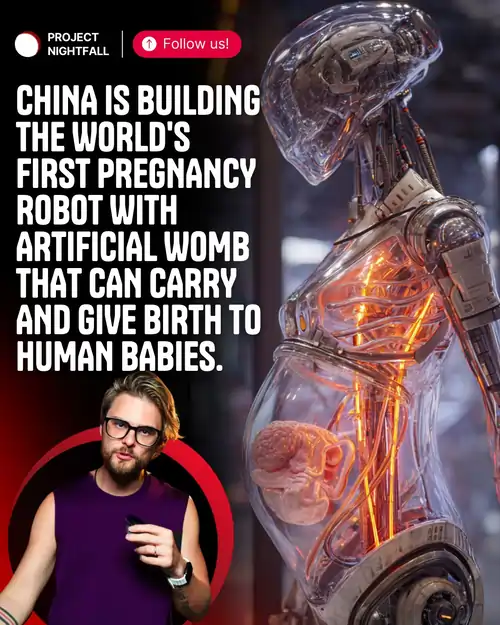China’s “Pregnancy Robot” with Artificial Womb: The Future of Birth or a Bioethical Dilemma?
China is once again pushing the boundaries of science and technology with a project that seems straight out of a futuristic novel: a humanoid “pregnancy robot” designed with an artificial womb capable of carrying and giving birth to human babies.
Developed by Dr. Zhang Qifeng and his team at Kaiwa Technology in Guangzhou, this groundbreaking innovation aims to tackle rising infertility rates in China while providing an alternative to traditional surrogacy. Yet, while the technology holds immense promise, it also raises profound ethical, social, and cultural debates about the future of childbirth and humanity itself.
(Source: Project Nightfall Facebook Post)

Share us on:
How the Pregnancy Robot Works
At the core of this innovation is an artificial womb—a fluid-filled chamber that mimics the environment of the human uterus.
- Artificial Umbilical Cord: Nutrients and oxygen are delivered to the developing fetus through a tube acting as an umbilical cord.
- Complete Cycle of Development: In theory, the machine could nurture a baby from fertilization to birth.
- Prototype Timeline: The first functioning prototype is expected by 2026, signaling a possible shift in how humans approach reproduction.
According to reports, the cost is estimated at 100,000 yuan ($14,000 USD), making it far cheaper than surrogacy in countries such as the United States, where costs can reach six figures.
Why China is Exploring Artificial Wombs
China faces one of the world’s most pressing demographic challenges:
- Declining Birth Rate: Fewer couples are choosing to have children despite the relaxation of the one-child policy.
- Infertility Issues: Rising cases of infertility are creating demand for alternative reproductive solutions.
- Expensive Surrogacy Options: Traditional surrogacy remains out of reach for many due to high costs and legal restrictions.
The pregnancy robot is being presented as a practical and affordable solution that could potentially reshape family planning.
The Ethical Questions Surrounding Pregnancy Robots
While the science is fascinating, the project opens up a Pandora’s box of ethical and philosophical dilemmas:
- Redefining Motherhood
If machines can carry babies, what does this mean for the role of women in childbirth? Could this alter the deeply human bond between mother and child? - Commodification of Birth
There is concern that childbirth could become commercialized—turning pregnancy into a purchasable service rather than a natural process. - Parental Rights and Family Identity
Who holds the rights over the unborn child in an artificial womb? How do laws adapt when machines become part of human reproduction? - Impact on Society and Culture
Many cultures see motherhood as sacred. The introduction of artificial wombs could challenge traditional values and norms.
Experts’ Perspective
- Medical Advantage: Some scientists argue that artificial wombs could help couples struggling with infertility and even save premature babies by allowing development outside the body.
- Ethical Concerns: Bioethicists warn that the technology could deepen inequalities, with wealthier individuals having easier access to artificial pregnancy while poorer communities remain excluded.
- Psychological Effects: The absence of natural maternal-fetal bonding may raise concerns about child development and emotional health.
Could This Be the Future of Reproduction?
Artificial wombs have long been a science fiction concept, but rapid advancements in biotechnology and robotics are bringing them closer to reality. If successful, China’s pregnancy robot could:
- Revolutionize fertility treatments worldwide.
- Provide solutions for women with medical conditions that prevent pregnancy.
- Spark global debate on reproductive rights and bioethics.
However, this technology may also face backlash from religious groups, cultural conservatives, and human rights advocates.
Conclusion
China’s pregnancy robot project represents a turning point in human history—where technology intersects with one of the most intimate and natural processes: childbirth.
While the promise of solving infertility and offering affordable alternatives to surrogacy is exciting, the ethical dilemmas cannot be ignored. Questions about motherhood, family, and humanity itself will continue to dominate discussions as this technology moves closer to reality.
Whether this innovation becomes a tool of hope or controversy, one thing is certain: it will ignite one of the biggest ethical debates of our time.
(Source: Project Nightfall Facebook Post)

A blogger with 3 years of experience in the online gaming niche specializes in creating detailed casino guides that help players make informed choices. They share practical tips, game strategies, and unbiased reviews drawn from hands-on research and testing. Remaining behind the scenes, they prioritize delivering trustworthy and engaging content to readers worldwide.